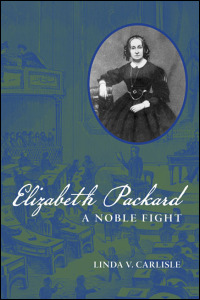I assigned Andrew Kersten's _Clarence Darrow: American Iconoclast_ in my fall 2011 Law and Society graduate class. As Kersten appropriately observes, Darrow was a complex man, who merited the sobriquet given him by the muckraker Lincoln Steffens, "Attorney for the Damned." Yet while justifiably celebrated as a forthright defender of individual freedom and liberty, Darrow frequently disappointed his allies. Certainly, his belief in equality did not extend to women, and in his personal life, Darrow treated his two wives with patronizing disdain. Kersten provides ample evidence that the crusading lawyer was capable of compromising his core values and was very much a believer that the end justifies the means.Read on here.
H-Law has also cross-posted a review, commissioned by H-Disability, of Linda V. Carlisle, Elizabeth Packard: A Noble Fight (University of Illinois Press, 2010). Here's the first paragraph, from reviewer David J. Roof (Minot State University):
Linda V. Carlisle has written a complex and comprehensive portrait of Elizabeth Packard (1816-97). It is a fascinating story, detailed with the intricacies of her historical context. In June 1850, Packard was placed, against her will, in the Jacksonville, Illinois, insane asylum by her disgruntled husband. She eventually won her release and devoted her life to reforming the rights of those deemed insane and to advocating for women’s rights.Read on here.

